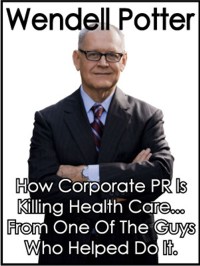
 This month’s Furious is all about one book. One book that can make you mad enough to last for years. Have you ever heard the phrase “Government takeover of health care”? It comes to you from a gentleman named Wendell Potter, a retired PR executive for the health insurance industry. He, and people like him, spend their careers figuring out ways
This month’s Furious is all about one book. One book that can make you mad enough to last for years. Have you ever heard the phrase “Government takeover of health care”? It comes to you from a gentleman named Wendell Potter, a retired PR executive for the health insurance industry. He, and people like him, spend their careers figuring out ways to drop people’s insurance when they get sick, mislead them about what their insurance covers, and lie to them about the state of health insurance and the implications of reform. Wendell retired from the industry “…because (he) could no longer serve in good conscience as a spokesman for an industry whose routine practices amount to a death sentence for thousands of Americans every year”, and now he’s telling the behind-the-scenes story the insurance industry doesn’t want you to know. If you haven’t heard about Wendell Potter already, then settle in. You won’t soon forget him.
to drop people’s insurance when they get sick, mislead them about what their insurance covers, and lie to them about the state of health insurance and the implications of reform. Wendell retired from the industry “…because (he) could no longer serve in good conscience as a spokesman for an industry whose routine practices amount to a death sentence for thousands of Americans every year”, and now he’s telling the behind-the-scenes story the insurance industry doesn’t want you to know. If you haven’t heard about Wendell Potter already, then settle in. You won’t soon forget him.

If this article has indeed made you Furious, then please click this link for something YOU can do to help bring single-payer healthcare to Oregon, and perhaps beyond
Here’s an excerpt from Wendell’s book “Deadly Spin- An Insurance Company Insider Speaks Out on How Corporate PR Is Killing Health Care and Deceiving Americans”, followed by our “News To Make You Furious” article from October, 2009, on “Stories from Health Care Hell”. Enjoy!
“Deadly Spin”- The Beginning
“My name is Wendell Potter and for twenty years, I worked as a senior executive at health insurance companies, and I saw how they confuse their customers and dump the sick— all so they can satisfy their Wall Street investors.”
That is how I introduced myself to the U.S. Senate Commerce, Science, and Transportation Committee on June 24, 2009. The committee’s chair, Senator Jay Rockefeller, D-W. Va., had asked me to testify as part of his investigation into health insurance company practices that for years had been swelling the ranks of the uninsured and the underinsured in the United States.
I explained how insurance companies make promises they have no intention of keeping, how they flout regulations designed to protect consumers, and how they make it nearly impossible to understand—or even obtain—information needed by consumers. I described how for-profit insurance companies, in their constant quest to meet Wall Street’s profit expectations, routinely cancel the coverage of policy-holders who get sick, and how they “purge” small businesses when their employees’ medical claims exceed what underwriters expected.
I knew that as soon as I said those words my life would change forever. It did—but in ways I never could have imagined.
I had quit my job as head of public relations at CIGNA—a job that had paid me deep into six figures—because I could no longer serve in good conscience as a spokesman for an industry whose routine practices amount to a death sentence for thousands of Americans every year.
I did not intend to go public as a critic of the industry. But it gradually became clear to me that the industry’s duplicitous PR strategy was going to manipulate public opinion and likely shape health care reform in ways that would benefit insurance company executives and their Wall Street masters far more than most other Americans.
I was eventually compelled to pull back the curtain on the industry’s deception-based PR strategy, which comprised two active fronts. One was a highly visible “charm offensive” designed to create an image of the industry as an advocate of reform—and a good-faith partner with the president and Congress in achieving it. The second front was a secret, fearmongering campaign using front groups and business and political allies as shills to disseminate misinformation and lies, with the sole intent of killing any reform that might hinder profits.
I had left my job at CIGNA in May 2008, but it wasn’t until 10 months later that I realized I couldn’t stay on the sidelines. As it turned out, it would be a fellow Tennessean who gave me one of the final shoves off the sidelines and into the spotlight and the new role of whistle-blower, as many people have called me.
It was March 5, 2009, and I was channel surfing for some news about the health care reform summit that President Obama was holding at the White House that day. Of the 120 or so people at the summit, many were from special interests that had the largest stakes financially in a reformed health care system: doctors, hospitals, drug and medical- device manufacturers, and, of course, insurers. Knowing that these groups had played a lead role in killing Bill and Hillary Clinton’s reform plan 15 years earlier, Obama wanted to keep them from doing the same this time around. Having campaigned as someone who could bring people with diverse points of view together to work toward the common good, Obama had brought the top lobbyists of each special interest group to his kickoff reform “table”—which the Clintons had not done—and openly solicited the groups’ support and cooperation. To win their support, his administration would eventually cut side deals with some of them, most notably the drugmakers.
I flipped to MSNBC just as Tamron Hall was getting ready to interview Republican representative Zach Wamp, from Tennessee’s Third Congressional District. I’m also from east Tennessee, although I have lived in Philadelphia since CIGNA relocated me to the company’s headquarters there in 1997. I grew up in Mountain City and Kingsport, both in the northeastern part of the state near the Virginia line. Wamp lives in Chattanooga, in the southeastern part of the state near the Georgia line.
When Hall asked Wamp about his views on the president’s ideas for reform, he just about called Obama a Marxist: “It’s probably the next major step toward socialism. I hate to sound so harsh, but … this literally is a fast march toward socialism, where the government is bigger than the private sector in our country, and health care’s the next major step, so we oughta all be worried about it.”
He then started accusing the Democrats of wanting to redistribute wealth in the country by taking money away from those who already had health care to pay for those who didn’t have it, many of whom, in his view, were just irresponsible bums waiting for a handout.
“Listen,” he said. “The forty-five million people that don’t have health insurance—about half of them choose not to have health insurance. Half of ’em don’t have any choice, but half of ’em choose to, what’s called ‘go naked,’ and just take a risk of getting sick. They end up in the emergency room, costing you and me a whole lot more money. How many illegal immigrants are in this country today, getting our health care? Gobs of ’em!”
As I listened to Wamp’s rant, I knew exactly where he’d gotten his talking points: from me.
He was using the same misleading, intentionally provocative and xenophobic talking points that I had helped write while serving on the Strategic Communications Advisory Committee of the insurers’ biggest trade group, America’s Health Insurance Plans (AHIP). We PR types had created those talking points, with help from language and polling experts, and given them to the industry’s lobbyists with instructions to get them into the hands of every “friendly” member of Congress. Most of the friendly ones were Republicans, and most were friendly because they had received a lot of money over the years in campaign contributions from insurance company executives and their political action committees.
(In spirited remarks on the House floor shortly before the vote on final reform legislation in 2010, Representative Anthony Weiner, D-N.Y., called the Republican Party a “wholly owned subsidiary of the insurance industry.” As someone who had managed CIGNA’s PAC contributions for several years, I knew Weiner’s remark had the ring of truth. CIGNA and other big insurers have contributed considerably more to Republicans than to Democrats.)
I was dismayed to hear Wamp’s demagogic remarks— and not just because I’d had a hand in writing his script, but also because I know his district well. If anybody in America could benefit from the Democrats’ vision of reform, it would be those who live in the counties he represents. Many are rural and remote, with high percentages of people who are either uninsured or underinsured. The per capita and house hold incomes in most of his counties are far below the national average. Yet the Third District’s representative—contrary to the best interests of his constituents— was saying exactly what the insurance industry wanted him to say.
Later that evening, I saw a couple of TV reports about the summit. One of the clips featured Karen Ignagni, AHIP’s president, standing up at the summit and telling the president he could count on her and the health insurance industry.
“Thank you, Mr. President,” she said. “Thank you for inviting us to participate in this forum. I think, on behalf of our entire membership, they would want to be able to say to you this afternoon and everyone here that we understand we have to earn a seat at this table. We’ve already offered a comprehensive series of proposals. We want to work with you. We want to work with the members of Congress on a bipartisan basis here. You have our commitment. We hear the American people about what’s not working. We’ve taken that seriously.”
Turning in one of her best performances to date, she added, “You have our commitment to play, to contribute, and to help pass health care reform this year.”
The president— having just been played like a Stradivarius by one of the best lobbyists ever to hit Washington—said, “Good. Thank you, Karen. That’s good news. That’s America’s Health Insurance Plans.”
The crowd cheered and applauded. They all seemed to be buying it—but I wasn’t, not by a long shot. I wasn’t surprised, either, at the president’s and the crowd’s reactions to what she had said.
Ignagni is one of the most effective communicators and—with a salary and bonuses of $1.94 million in 2008—one of the highest-paid special interest advocates in Washington. I’ve known her since she left the AFL-CIO in the early 1990s to lead one of AHIP’s predecessors, the Group Health Association of America, an HMO trade group of which Humana was a member when I worked for that insurer. I knew from the first time I met her that she was the perfect choice to lead the insurance industry. She is smart, telegenic, articulate, charming, a strong leader, and a brilliant strategist. Following her success in shaping to her industry’s liking the legislation creating the Medicare prescription drug program, Princeton economist Uwe Reinhardt commented, “Whatever AHIP pays her is not enough.”
I realized after watching the exchange between Ignagni and Obama that I had seen both sides of the industry’s duplicitous PR campaign in a single day. Ignagni was saying what she knew the president and the inside-the-Beltway crowd wanted to hear, while Wamp was saying what the industry wanted him to say to the rest of the world. He was a tool in the industry’s effort to use “third parties” to kill key elements of the president’s plan, if not all of it, by scaring and lying to the public.
But it was another televised interview the following Monday that pushed me from the sidelines and into the fray. Four days after the White House summit, Chris Matthews was interviewing Mike Tuffin, AHIP’s executive vice president of strategic communications, on his MSNBC show, Hardball. “The same people who helped kill the Clintons’ efforts back in the ’90s are on the other side now,” Matthews said in introducing Tuffin. “Times have changed. The worm has turned. The cosmos has shifted. Some of the bad guys are becoming perhaps the good guys.”
There was no doubt about it: Tuffin was on the show as part of AHIP’s charm offensive.
“This time,” he told Matthews, “we’re coming to the table with solutions. We want to be part of the process. We pledged that to the president. We’re calling for new regulations on our industry to make sure everyone has guaranteed access to coverage.” He thus joined Ignagni in spinning the fiction that, for the first time ever, insurers were willing to accept more regulations and change their ways so that everybody in America could “have access to affordable, quality care” (a favorite term of industry leaders).
And just like Obama, Matthews seemed to be falling for it.
(From October, 2009) This month’s NEWS TO MAKE YOU FURIOUS comes from the healthcare debate, where reasoned and rational people calmly debate the merits of various well-considered and comprehensive plans, weighing the rights of people to live healthy lives against…well, whatever weighs against that. Here’s a few mouth-dropping stories about real people and their interactions with the Insurance Board Death Panels. Unfortunately, if you’re interested, it’s easy to find more.
This American Life– Always good on any subject, they really get going on this one. “Fine Print” has a great story about how pharmaceutical companies manipulate you (and your insurance company) into paying high prices for brand name drugs when generics are available. You probably don’t even realize it’s happening.
Yes!- Personal stories from patients, doctors, and activists
DEAD LINK (4/24/12)- WFAA- Dallas TV Station with story of a 27-year-old whose plug was pulled-
The Agonist- More stories in nice little boxes
Firedoglake- Fun with medical bills
Commonwealth Fund Top 10 Health Policy Stories
Los Angeles Times- Heartwarming article on Blue Cross employees getting good performance reviews.
Baseline Scenario- Fun facts about rescission. How could this possibly be legal?










